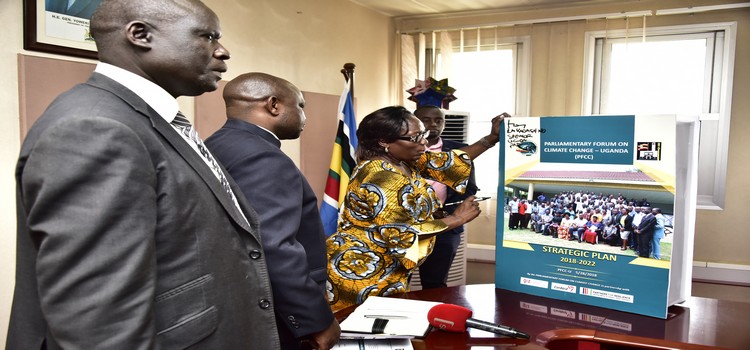
Speaker of Parliament Rebecca Kadaga Launching a Strategic Plan of the Parliamentary Forum on Climatic Change
The Speaker of Parliament, Rebecca Kadaga, has called on government to support communities with alternative sources of energy saying this will reduce pressure on forests.
Kadaga said that use of alternatives to charcoal and firewood will be a step to positive climate change.
Kadaga who was speaking at the launch of a five-year Strategic Plan for the Parliamentary Forum on Climate Change said “as long as we do not find alternative cooking energy for our people, they will continue burning charcoal and cutting down trees”.
The Uganda National Household Survey 2016/2017 showed that almost every household in Uganda uses either firewood or charcoal for cooking.
The Speaker however observed that there has been laxity in response to climate change and general environmental issues.
“Many people are not taking matters of climate change seriously. I think there is some kind of laissez-faire [approach] in addressing climate change issues,” she said.
Kadaga urged the Parliamentary Forum on Climate Change to prioritize advocacy for alternative cooking energy and afforestation in its five year plan.
The Speaker also applauded Parliament’s afforestation programme, which was started in Moroto district and announced a plan for scale-up countrywide.
“We have started in Mt Moroto, one of the oldest mountains which has been depleted and we are going to scale up countrywide. We have also been working on a number of highways so as to replace trees,” Kadaga said.
Spearheaded by the Department of Communication and Public Affairs, Parliament embarked on a drive to plant trees in various parts of the country, under the institution’s Corporate Social Responsibility programme.
At the launch of the programme in June, the Speaker called for an end to charcoal burning and its exportation to neighboring countries and warned that Parliament would institute punitive measures against persons involved in the practice.
The Chairperson of the Forum, Hon. Lawrence Biyika Songa (NRM, Ora County) expressed discontentment with inadequate funding for climate change programmes which he said is not only an issue in Uganda but in several other African countries.
“Climate change and other environmental issues are important to us but when it comes to budgeting, they are treated as cross cutting issues,” adding that “treating this important sector as cross cutting affects funding for the sector. We need to work on a law that positions the environment sector as priority,” said Biyika.
The Parliamentary Forum on Climate Change (PFCC) was formed in 2008 by members of the 8th Parliament to respond to the pressing environmental, social and economic issues presented by climate change. The Forum seeks to ensure effectiveness in policies and actions for harmonized and coordinated approaches towards climate change resilience and sustainable development in Uganda.
The Strategic Plan seeks to re-position Parliament to strengthen its oversight roles on climate change, ensure resilient and gender sensitive climate change laws, provide an interface for climate change dialogue and support climate change sensitive budgetary allocation and appropriation.
